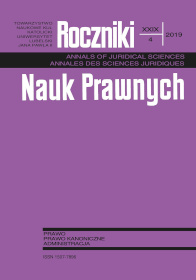Autonomy of Ecclesiastical Tribunals Pronouncing the Nullity of Canonical Marriage: a Trigger for an Analysis of the Problem
Abstract
According to Article 25, Paragraph 3 of the Constitution of the Polish Republic of 2 April 1997, “the relationship between the State and churches and other religious organizations shall be based on the principle of respect for their autonomy and the mutual independence of each in its own sphere.” The consequences of the principles of independence and autonomy of the State and the Church, which assume a reciprocal acceptance of independent legal systems within limits decided by both sides, are the guarantees included in Article 10 of the Concordat. In that Article, pronouncing judgments concerning canonical marriage is left to ecclesiastical jurisdiction, and, in an analogical way, pronouncing judgments concerning concordat marriage – to state jurisdiction. In practice, it means that a sentence of a civil tribunal pronouncing the divorce has no legal consequences in the sphere of canon law, while pronouncing the nullity of marriage by a Catholic tribunal does not influence the civil status of that marriage.
In order to preserve autonomy of ecclesiastical tribunals it is very important that non-ecclesiastical subjects refrain from interfering with the process of collecting evidence by an ecclesiastical tribunal and from using the gathered material outside of canonical courts (for instance, in civil cases or criminal cases in state courts). The secret ought to be kept not only by employees of ecclesiastical courts, attorneys and experts, but also by the parties in litigation. The author of this paper devotes a lot of attention to this issue.
A sentence of an ecclesiastical tribunal determines the range of possibilities of participating in the sacramental life of the Catholic Church by the parties to a case. In fact, the legal consequences of a canonical sentence refer not only to the possibility of getting married with a third party by the parties in litigation (or to the lack of this possibility). They also relate to the possibility of going to confession or receiving the Holy Communion. From this perspective, preserving autonomy of ecclesiastical tribunals in the sphere of the nullity of marriage is a fundamental issue when it comes to the constitutional freedoms of conscience and religion of persons remaining under the jurisdiction of those tribunals.
References
Borecki Paweł: Respektowanie polskiego konkordatu z 1993 – wybrane problemy, Warszawa: Instytut Spraw Publicznych 2012.
Capello Felice M.: Summa iuris publici ecclesiastici, Romae: Pontificia Universitas Gregoriana 1943. Góralski Wojciech, Adamczewski Witold: Konkordat między Rzeczpospolitą Polską a Stolicą Apostolską z 28 lipca 1994 r., Płock: Płockie Wydawnictwo Diecezjalne 1994.
Góralski Wojciech, Pieńdyk Andrzej: Zasada niezależności i autonomii państwa i Kościoła w konkordacie polskim z 1993 roku, Warszawa: Wydawnictwo Naukowe UKSW 2000.
Infiesta Jesús: El Estado ha de ser laico, La Vanguardia (de 28 de enero de 1978), s. 22.
Kroczek Piotr: Prawo wewnętrzne związków wyznaniowych w perspektywie organów władzy publicznej. Klauzule generalne, Kraków: Wydawnictwo Naukowe UPJPII 2017.
Krukowski Józef: Polskie prawo wyznaniowe, Warszawa: LexisNexis 2005.
Krzywkowska Justyna: Prawo do prywatności w procesie o nieważność małżeństwa, [w:] Prawo do prywatności w Kościołach i innych związkach wyznaniowych, red. T.J. Zieliński, M. Hucał, Warszawa: Wydawnictwo Naukowe ChAT 2019, s. 339-354.
León Rey Enrique de: Publicación de las actas, privacidad de los hechos y prueba secreta (can. 1598 § 1 CIC 83 / art. 230 DC), [w:] Procesos matrimoniales canónicos, red. Asociación Española de Canonistas, Madrid: Dykinson 2014, s. 157-171.
Łukańko Bernard: Kościelne modle ochrony danych osobowych, Warszawa: Wolters Kluwer 2019.
Majer Piotr: Ochrona prywatności w kanonicznym porządku prawnym, [w:] Ochrona danych osobowych i prawo do prywatności w Kościele, red. P. Majer, Kraków: Wydawnictwo Naukowe Papieskiej Akademii Teologicznej 2001, s. 67-98.
Mezglewski Artur, Misztal Henryk, Stanisz Piotr, Prawo wyznaniowe, Warszawa: C.H. Beck 2008. Moneta Paolo: La “Salus animarum” sul dibattito della scienza giuridica, Ius Ecclesiae 12 (2000), nr 2, s. 307-326.
Morán Bustos Carlos M.: Criterios de actuación de los miembros del tribunal y los abogados en el desarrollo del proceso de nulidad, [w:] Procesos matrimoniales canónicos, red. Asociación Española de Canonistas, Madrid: Dykinson 2014, s. 25-114.
Ottaviani Alfredo: Institutiones iuris publici ecclesiastici, vol. II: Ecclesia et status, Vaticani: Typis Polyglottis Vaticanis 1960.
Ôrsy Ladislas: The Reception of Laws by the People of God: a Theological and Canonical Inquiry in the Light of Vatican Council II, The Jurist 55 (1995), s. 504-526.
Pellegrini Piero: La salus animarum, Ius Canonicum 44 (2004), nr 87, s. 141-151.
Pietrzak Michał: Prawo kanoniczne w polskim systemie prawnym, Państwo i Prawo 8 (2006), s. 16-31.
Rozkrut Tomasz: Kanoniczny proces o nieważność małżeństwa: proces sporny czy proces specjalny?, Prawo Kanoniczne 53 (2010), nr 3-4, s. 172-182.
Ryguła Piotr: Ochrona danych osobowych w procesie o nieważność małżeństwa kanonicznego w sądach Kościoła katolickiego w Polsce, w: Internet. Przetwarzanie danych osobowych. Processing of personal data, red. G. Szpor, K. Czaplicki, Warszawa: C.H. Beck 2019, s. 165-174.
Ryguła Piotr: Wolność religijna w Hiszpanii na tle przemian społeczno-politycznych w latach 1931-1992, Katowice: Wydawnictwo Naukowe UŚ 2009.
Rzepecki Andrzej: Funkcjonowanie prawa kanonicznego w polskim porządku prawnym – zarys tematu, Acta Erasmiana 5 (2013), s. 163-184.
Satorras Fioretti Rosa M.: Aconfesionalidad del Estado y Cooperación con las confesiones religiosas (Art. 16.3 CE), Barcelona: Cedecs 2001.
Sobański Remigiusz: Kościół jako podmiot prawa, Warszawa: Akademia Teologii Katolickiej 1983. Sobański Remigiusz: Prawo kanoniczne a krajowy porządek prawny, Państwo i Prawo 6 (1999), s. 3-17.
Sobański Remigiusz: Recepcja prawa w Kościele, Prawo Kanoniczne 46 (2003), nr 3-4, s. 3-14.
Sobczyk Paweł: „Każdy przecinek w tym konkordacie jest zrobiony za moja osobistą zgodą” – Kilka uwag na temat wpływu papieża Piusa XI na treść konkordatu polskiego z 1925 roku, Prawo Kanoniczne 53 (2010), nr 3-4, s. 273-288.
Trzeciak Bogusław: Relacje Państwo-Kościół: konkordat ’93-’98, Warszawa: Kontrast 1998.
Tunia Anna: Recepcja prawa wewnętrznego związków wyznaniowych w prawie polskim, Lublin: Wydawnictwo KUL 2015.
Copyright (c) 2019 Roczniki Nauk Prawnych

This work is licensed under a Creative Commons Attribution-NonCommercial-NoDerivatives 4.0 International License.


